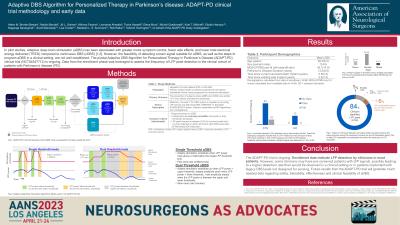Adaptive DBS Algorithm for Personalized Therapy in Parkinson’s Disease: ADAPT-PD clinical trial methodology and early data
Adaptive DBS Algorithm for Personalized Therapy in Parkinson’s Disease: ADAPT-PD Clinical Trial Methodology and Early Data
Friday, April 21, 2023


Rebekah L. Summers, DPT, PhD (she/her/hers)
Principal Clinical Scientist
Medtronic
ePoster Presenter(s)
Introduction: To describe the design and early data from the pivotal Adaptive DBS Algorithm for Personalized Therapy in Parkinson’s Disease (ADAPT-PD) clinical trial (NCT04547712). In pilot studies, adaptive deep brain stimulation (aDBS) has been associated with greater motor symptom control, fewer side effects, and lower total electrical energy delivered (TEED) compared to continuous DBS (cDBS).
Methods: The ADAPT-PD study is a multicenter, prospective, single-blind, randomized crossover clinical investigation evaluating the safety and effectiveness of aDBS for Parkinson’s disease (PD). The study includes a cohort without (primary cohort) and with directional stimulation (directional cohort). Participants have globus pallidus pars interna or subthalamic nucleus DBS leads connected to a Medtronic PerceptTM PC DBS device capable of sensing local field potentials (LFPs). An investigational feature is unlocked to allow programming of two different aDBS modes using low frequency (8-30 Hz) LFP control signals. The study consists of four phases following enrollment: cDBS Baseline, aDBS Setup and Adjustment, aDBS Evaluation, and Long-term Follow-up. Randomized, single-blinded crossover to aDBS in a single or dual-threshold mode is executed in participants with an acceptable response to either or both aDBS modes.
Results: The clinical trial is ongoing with 12 centers activated and 10 sites which have enrolled a primary cohort of 68 and a directional cohort of 17. Demographic and preliminary data will be featured at the time of presentation. Primary endpoint is the equivalence of aDBS to cDBS for ON time without troublesome dyskinesia. Other endpoints are TEED, motor assessments from a wearable device, Voice Handicap Index, MDS-UPDRS, EQ-5D-5L, PDSS-2, PDQ-39, and patient preference. Safety measures include stimulation-related adverse events (AEs), other AEs, and device deficiencies.
Conclusion : This pivotal clinical study of aDBS in a clinical and home setting is expected to generate data to assess the safety and effectiveness for aDBS in PD.
Methods: The ADAPT-PD study is a multicenter, prospective, single-blind, randomized crossover clinical investigation evaluating the safety and effectiveness of aDBS for Parkinson’s disease (PD). The study includes a cohort without (primary cohort) and with directional stimulation (directional cohort). Participants have globus pallidus pars interna or subthalamic nucleus DBS leads connected to a Medtronic PerceptTM PC DBS device capable of sensing local field potentials (LFPs). An investigational feature is unlocked to allow programming of two different aDBS modes using low frequency (8-30 Hz) LFP control signals. The study consists of four phases following enrollment: cDBS Baseline, aDBS Setup and Adjustment, aDBS Evaluation, and Long-term Follow-up. Randomized, single-blinded crossover to aDBS in a single or dual-threshold mode is executed in participants with an acceptable response to either or both aDBS modes.
Results: The clinical trial is ongoing with 12 centers activated and 10 sites which have enrolled a primary cohort of 68 and a directional cohort of 17. Demographic and preliminary data will be featured at the time of presentation. Primary endpoint is the equivalence of aDBS to cDBS for ON time without troublesome dyskinesia. Other endpoints are TEED, motor assessments from a wearable device, Voice Handicap Index, MDS-UPDRS, EQ-5D-5L, PDSS-2, PDQ-39, and patient preference. Safety measures include stimulation-related adverse events (AEs), other AEs, and device deficiencies.
Conclusion : This pivotal clinical study of aDBS in a clinical and home setting is expected to generate data to assess the safety and effectiveness for aDBS in PD.
